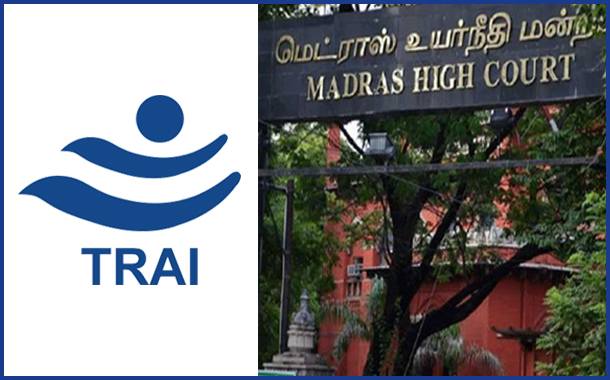Chennai: The Madras High Court bench headed by Chief Justice Indira Banerjee and Justice M. Sundar on Friday differed on the judgment related to the writ petitions filed by Star TV against TRAI’s new Tariff Order of 2017.
The Judges were not been able to agree on the issue of upholding certain provisions of the Telecommunication (Broadcasting and Cable) Services Interconnection (Addressable Systems) Regulations of 2017 and Telecommunication (Broadcasting and Cable) Services (Eighth) (Addressable Systems) Tariff Order of 2017 issued by the Telecom Regulatory Authority of India (TRAI).While Mr. Justice Sundar struck down the provisions under challenge, the Chief Justice delivered a dissenting judgment, wherein she held that the TRAI was well within its right to impose restrictions on the pricing of bouquets of television channels in the interest of the end users who may not be duped or misled by inclusion of free channels and less popular channels in bouquets to increase the number of channels on offer.
Since the Chief Justice had differed with her co-judge in the first Division Bench, she asked the High Court Registry to place the writ petitions filed by Star India and Vijay Television, challenging the regulations as well as tariff order issued by the TRAI, before the next available judge in the court in the order of seniority (which happens to be Justice Huluvadi G. Ramesh) for nomination of the third judge before whom the case could be listed for hearing. However, since the Chief Justice herself referred the case to Senior Judge, It attracts the possibilities of the case being handed over to the Supreme Court Bench.
The case gains significance since what had been challenged were the regulations and tariff order brought in by the TRAI to streamline the broadcasting industry by stating that television channels, when given in bouquets, should not be a mix of pay channels and free to air channels. The TRAI had held that when channels were offered in a bouquet, one bouquet should either contain pay channels only or free to air channels only.One more restriction was when channels were offered in a bouquet, the high definition and standard definition formats of the same channel should not be in the same bouquet.
The regulations as well as the tariff order also mandate that a bouquet of pay channels should not contain any channel whose maximum retail price (MRP) was more than ₹19. They stated that the MRP of a bouquet should not be more than 85% of the sum of a-la-carte MRP of pay channels constituting the bouquet.
There was a clause which stated that discounts on MRP of a bouquet should not exceed 15% and this was the only clause which the Chief Justice also felt was arbitrary and unfair.
The inconclusiveness in the verdict of Madras High Court has casted another spell of uncertainty in the policy decision making of the Regulatory Authority – TRAI.
This is the second major policy decision of TRAI that got struck due to the interference of judiciary. The first one was the ad-cap case that mandates the implementation of four minutes ad-cap, that is facing inconclusive adjournments in Delhi High Court and the second being the TRAI’s new Tariff Order of 2017 that is also facing a similar fate after this split verdict from Madras High Court. Havind said that the present scenario favours the industry stakeholders and helps them to maintain a status quo until further orders from the judiciary.

















